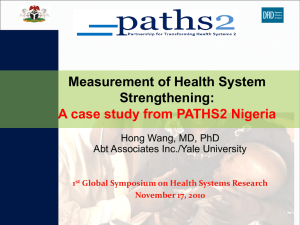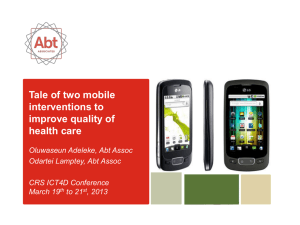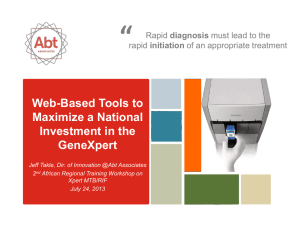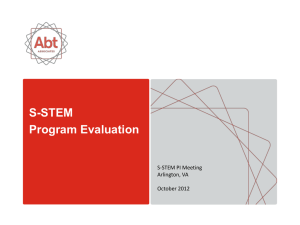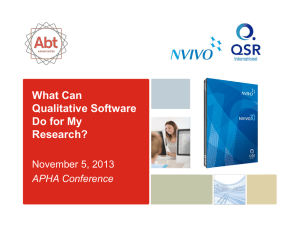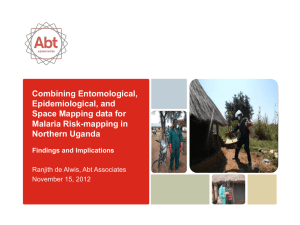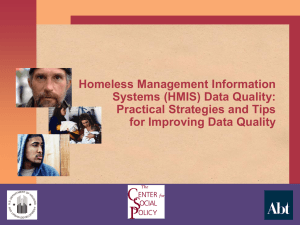The Global Challenge of Food Safety
advertisement
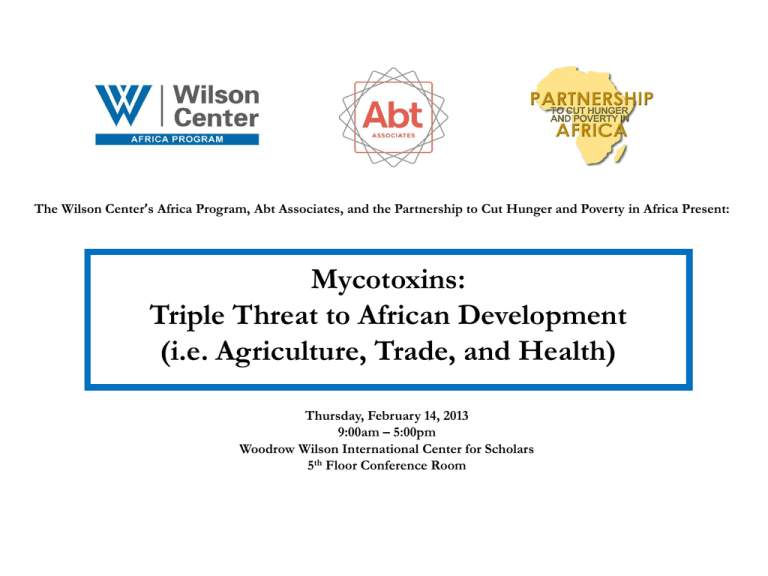
The Wilson Center’s Africa Program, Abt Associates, and the Partnership to Cut Hunger and Poverty in Africa Present: Mycotoxins: Triple Threat to African Development (i.e. Agriculture, Trade, and Health) Thursday, February 14, 2013 9:00am – 5:00pm Woodrow Wilson International Center for Scholars 5th Floor Conference Room A Presentation at Mycotoxins: Triple Threat to African Development Washington, DC 14 February 2013 The Global Challenge of Food Safety by John E. Lamb, Abt Fellow Why this event, here and now? The evidence base for mycotoxins and aflatoxins as threats to agriculture, health, nutrition, and trade is expanding rapidly Abt Associates | pg 3 Why this event, here and now? The evidence base for mycotoxins and aflatoxins as threats to agriculture, health, nutrition, and trade is expanding rapidly The topics at hand are extremely important to economic and social progress in Africa and all developing countries Abt Associates | pg 4 Why this event, here and now? The evidence base for mycotoxins and aflatoxins as threats to agriculture, health, nutrition, and trade is expanding rapidly The topics at hand are extremely important to economic and social progress in Africa and all developing countries Yet the political will, funding levels, and extent of development activity do not yet match the challenges Abt Associates | pg 5 Why this event, here and now? The evidence base for mycotoxins and aflatoxins as threats to agriculture, health, nutrition, and trade is expanding rapidly The topics at hand are extremely important to economic and social progress in Africa and all developing countries Yet the political will, funding levels, and extent of development activity do not yet match the challenges On other hand, significant new global structures for food safety have emerged 1990s: WTO SPS 2000s: Private standard schemes, GFSI 2010s: APEC FSCF, GFSP Abt Associates | pg 6 Difficult to work in international agricultural development without getting caught up Over tolerance pesticide residues in snowpeas Salmonella in melons Cyclospora in red raspberries Abt Associates | pg 7 Abt Associates Inc. What are the objectives for this event? Raise awareness of the issues (for food safety, mycotoxins, aflatoxin control) among a cross-section of leading development policy-makers, practitioners and researchers Abt Associates | pg 8 What are the objectives for this event? Raise awareness of the issues (for food safety, mycotoxins, aflatoxin control) among a cross-section of leading development policy-makers, practitioners and researchers Broaden and deepen understanding of the current state of knowledge Abt Associates | pg 9 What are the objectives for this event? Raise awareness of the issues (for food safety, mycotoxins, aflatoxin control) among a cross-section of leading development policy-makers, practitioners and researchers Broaden and deepen understanding of the current state of knowledge Point out pathways for greater institutional and personal involvement Abt Associates | pg 10 What are the objectives for this event? Raise awareness of the issues (for food safety, mycotoxins, aflatoxin control) among a cross-section of leading development policy-makers, practitioners and researchers Broaden and deepen understanding of the current state of knowledge Point out pathways for greater institutional and personal involvement Facilitate greater collaboration between interested individuals, units and agencies Abt Associates | pg 11 What are the objectives for this event? Raise awareness of the issues (for food safety, mycotoxins, aflatoxin control) among a cross-section of leading development policy-makers, practitioners and researchers Broaden and deepen understanding of the current state of knowledge Point out pathways for greater institutional and personal involvement Facilitate greater collaboration between interested individuals, units and agencies Stimulate higher levels of intellectual, programmatic and financial investment Abt Associates | pg 12 What are the objectives for this event? Raise awareness of the issues (for food safety, mycotoxins, aflatoxin control) among a cross-section of leading development policy-makers, practitioners and researchers Broaden and deepen understanding of the current state of knowledge Point out pathways for greater institutional and personal involvement Facilitate greater collaboration between interested individuals, units and agencies Stimulate higher levels of intellectual, programmatic and financial investment Share in the excitement that surrounds the emergence of a new community of practice Abt Associates | pg 13 During the latter half of the last century agriculture was divorced from health & nutrition Past Abt Associates | pg 14 Abt Associates Inc. Yet in the last five years a deliberate effort began to bring these sectors together Past Present Abt Associates | pg 15 Abt Associates Inc. There is growing consensus that all three sectors interact with each other Past Present Nutrition Near Future Abt Associates | pg 16 Abt Associates Inc. Development hypothesis for today Future Perfect Agriculture Food Safety Health Nutrition Abt Associates | pg 17 Abt Associates Inc. Development hypothesis for today Future PluPerfect Agriculture Food Safety Mycotoxins Health Nutrition Abt Associates | pg 18 Abt Associates Inc. Why food safety matters to the private sector Concern for consumers Risk to brand Legal liability Costs for remediation Disruption or loss of market access Reduced competitiveness Investment required for prevention and control Impact on profitability Abt Associates | pg 19 Abt Associates Inc. What worries food industry executives most? Abt Associates | pg 20 Why food safety matters to the public sector Concern for public health and consumer protection Differential impacts on the vulnerable Loss of individual productivity and aggregate output Compliance with international agreements Risk to country image Disruption or loss of foreign markets Reduced competitiveness in international trade Investment required for compliance, prevention, and control Abt Associates | pg 21 Abt Associates Inc. Economic loss from foodborne disease in USA 14 of the 31 major foodborne pathogens account for 95% of illness and hospitalization and 98% of deaths attributable to identifiable pathogens These 14 are estimated to cause $14.0 billion in cost of illness and loss of 61,000 QALYs Roughly 90% of this loss is caused by five pathogens: – nontyphoidal Salmonella enterica ($3.3 billion; 17,000 QALYs) – Campylobacter spp. ($1.7 billion; 13,300 QALYs) – Listeria monocytogenes ($2.6 billion; 9,400 QALYs), – Toxoplasma gondii ($3 billion; 11,000 QALYs), and – norovirus ($2 billion; 5,000 QALYs). Abt Associates | pg 22 Abt Associates Inc. Why food (un)safety should matter more to the international development community Weakens the competitive position of producers, industries and countries in which agriculturally based enterprises are significant contributors to commerce Abt Associates | pg 23 Why food (un)safety should matter more to the international development community Weakens the competitive position of producers, industries and countries in which agriculturally based enterprises are significant contributors to commerce Causes great harm to individual health, nutritional status, and productivity, which affects entire families and especially the most vulnerable Abt Associates | pg 24 Why food (un)safety should matter more to the international development community Weakens the competitive position of producers, industries and countries in which agriculturally based enterprises are significant contributors to commerce Causes great harm to individual health, nutritional status, and productivity, which affects entire families and especially the most vulnerable Interferes with other crosscutting objectives such as gender empowerment, enterprise development, labor force development, human capital Abt Associates | pg 25 Why food (un)safety should matter more to the international development community Weakens the competitive position of producers, industries and countries in which agriculturally based enterprises are significant contributors to commerce Causes great harm to individual health, nutritional status, and productivity, which affects entire families and especially the most vulnerable Interferes with other crosscutting objectives such as gender empowerment, enterprise development, labor force development, human capital Necessitates remedial treatment and mitigation measures that often cost much more than prevention would have cost Abt Associates | pg 26 Why food (un)safety should matter more to the international development community Weakens the competitive position of producers, industries and countries in which agriculturally based enterprises are significant contributors to commerce Causes great harm to individual health, nutritional status, and productivity, which affects entire families and especially the most vulnerable Interferes with other crosscutting objectives such as gender empowerment, enterprise development, labor force development, human capital Necessitates remedial treatment and mitigation measures that often cost much more than prevention would have cost Reduces GDP directly and indirectly Abt Associates | pg 27 What is the rationale for the international development community to get more involved in food safety? 1. Food/water safety control systems in developing countries are often not up to best practice standards 2. The resulting adverse impacts on human health and welfare, as well as on economic and social progress, interfere with higher level MDG and food security objectives 3. Growth in trade, the natural evolution of long standing hazards, and appearance of new ones, together are outstripping the risk mitigation capacity of developing country food control systems (and even those of many developed countries) 4. Regulators increasingly recognize that they cannot inspect their way to a safer food supply, need to get closer to source areas, and must collaborate with a whole host of international, public and private partners to make the world of food safer for consumers Abt Associates | pg 28 Abt Associates Inc. 31 March 2011 What is rationale for the international development community to get more involved in food safety? 5. Although the private sector has made tremendous progress in upgrading proprietary supply chains, there are millions of suppliers and handlers who remain outside the commercial chains 6. There is a great disparity between expectations, incentives, and performance between modern supply chains that aim for export markets and traditional supply chains that deliver to domestic and regional markets 7. Upgrading requires developmental investment, and domestic especially funding is very scarce 8. Host governments rarely approach this challenge pro-actively, have many other demands, and lack technical resources 9. Development agencies get asked, and in fact can help Abt Associates | pg 29 Abt Associates Inc. 31 March 2011 Why food safety presents a particularly difficult development challenge Most evident by its absence Old approach emphasized control over prevention Traditionally relegated to governments, and within that to regulators Abt Associates | pg 30 Abt Associates Inc. Why food safety presents a particularly difficult development challenge Most evident by its absence Old approach emphasized control over prevention Traditionally relegated to governments, and within that to regulators Standard setting body has trouble keeping up with Natural tension between regulators and the regulated Inherently cross sectoral, straddling departments and agencies Abt Associates | pg 31 Abt Associates Inc. Why food safety presents a particularly difficult development challenge Most evident by its absence Old approach emphasized control over prevention Traditionally relegated to governments, and within that to regulators Standard setting body has trouble keeping up with Natural tension between regulators and the regulated Inherently cross sectoral, straddling departments and agencies Requires very specific technical expertise in a wide array of disciplines, themes, commodities, industries Difficult to agree on priorities Hard data is often lacking Abt Associates | pg 32 Abt Associates Inc. The food safety field is complex Policies and Regulations Control Systems Analytical Capacity Incident Management Abt Associates | pg 33 The food safety field is complex Policies and Regulations Control Systems Analytical Capacity Incident Management These were mainly concerns of regulatory bodies, standard setting agencies and the WTO Abt Associates | pg 34 The food safety field is complex Policies and Regulations Control Systems Analytical Capacity Incident Management Risk Assessment Risk Management Risk Communications Abt Associates | pg 35 The food safety field is complex Policies and Regulations Control Systems Analytical Capacity Incident Management Risk Assessment Risk Management Risk Communications Risk analysis involves both the regulatory community and the agrifood community Abt Associates | pg 36 The food safety field is complex Policies and Regulations Control Systems Analytical Capacity Incident Management Risk Assessment Risk Management Risk Communications Industry and Supply Chain Interventions Abt Associates | pg 37

